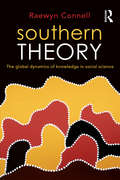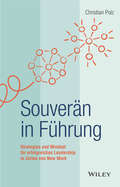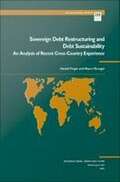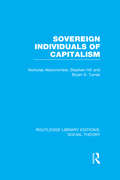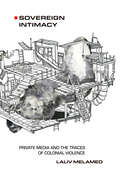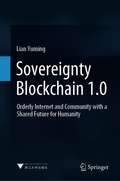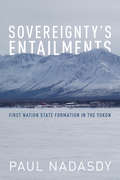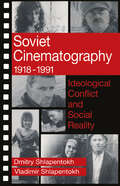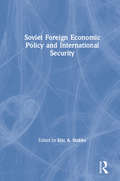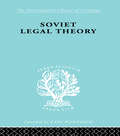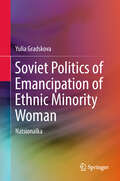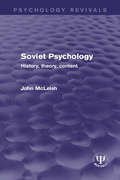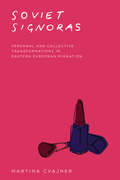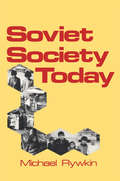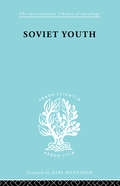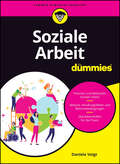- Table View
- List View
Southern Theory: The global dynamics of knowledge in social science
by Raewyn ConnellSouthern Theory presents the case for a radical re-thinking of social science and its relationships to knowledge, power and democracy on a world scale.Mainstream social science pictures the world as understood by the educated and affluent in Europe and North America. From Weber and Keynes to Friedman and Foucault, theorists from the global North dominate the imagination of social scientists, and the reading lists of students, all over the world. For most of modern history, the majority world has served social science only as a data mine.Yet the global South does produce knowledge and understanding of society. Through vivid accounts of critics and theorists, Raewyn Connell shows how social theory from the world periphery has power and relevance for understanding our changing world from al-Afghani at the dawn of modern social science, to Raul Prebisch in industrialising Latin America, Ali Shariati in revolutionary Iran, Paulin Hountondji in post-colonial Benin, Veena Das and Ashis Nandy in contemporary India, and many others.With clarity and verve, Southern Theory introduces readers to texts, ideas and debates that have emerged from Australia's Indigenous people, from Africa, Latin America, south and south-west Asia. It deals with modernisation, gender, race, class, cultural domination, neoliberalism, violence, trade, religion, identity, land, and the structure of knowledge itself.Southern Theory shows how this tremendous resource has been disregarded by mainstream social science. It explores the challenges of doing theory in the periphery, and considers the role Southern perspectives should have in a globally connected system of knowledge. Southern Theory draws on sociology, anthropology, history, psychology, economics, philosophy and cultural studies, with wide-ranging implications for social science in the 21st century.
Southern Women
by Caroline M. DillmanFirst published in 1988. Routledge is an imprint of Taylor & Francis, an informa company.
Southwestern Women Writers and the Vision of Goodness: Mary Austin, Willa Cather, Laura Adams Armer, Peggy Pond Church, Alice Marriott
by Catharine Savage BrosmanThis book, a project in literary history and criticism, examines five women authors of the American Southwest, two well known, three much less so: They stand out for their striving to give a woman's voice to aspects of the Southwest as it was during their lifetimes. All five authors displayed sensitivity to and concern for southwestern landscapes, arts, and people; they valued harmony in human relationships and endeavors; they were interested in the past and sought to preserve it. Marked differences in experience, temperaments, talents, and perspectives exist among them, however, although their common feminine condition supposes some similarity of approach, including limitations (biological and, to some degree, social).
Souvenirs: The Material Cultre of Tourism (Routledge Revivals)
by Michael Hitchcock Ken TeagueThis title was first published in 2000: Souvenirs, broadly conceived, are generally thought to be the material counterpart of travels, events, relationships and memories of all kinds. The material items classed as souvenirs discussed in this text have memorial functions, usually connected with the owner's travels. But not all of the items are souvenirs of tourism; they are also souvenirs of other past phenomena, such as political events (suffragettes), colonial history (India), former artistic pre-eminence (Awaji Ningyo puppetry) or former ways of life (South American ceramic archaisms). The authors do not necessarily focus on material souvenirs in their memorial function as prompters of memory. They also use their case studies as starting points for the discussion of many interesting contemporary phenomena, such as cottage industries for economic development in Mexico and Ainu, as devices to invigorate or maintain artistic practices, as emblems of cultural conformity (Surrealists) or as symbolic weapons in national and international political arguments. A key focus of many of the chapters is the question of meaning: what is the meaning of any particular souvenir or collection, and for whom does it bear that meaning?
Souverän in Führung: Strategien und Mindset für erfolgreiches Leadership in Zeiten von New Work
by Christian PolzNichts ist, wie es mal war. Die Herausforderungen der modernen Arbeitswelt erfordern es, Führung neu zu denken, neu zu justieren und neu auszurichten. Der Autor beschreibt in seinem praxisorientierten Ratgeber, wie Führung heute und zukünftig gelingt. Im Fokus steht das Collective Leadership: Jeder im Unternehmen, jeder in der Abteilung und jeder im Team übernimmt Verantwortung. Will, darf und soll Verantwortung übernehmen. "Wir sind alle Leader!", so das Leitmotiv. Wer Collective Leadership etablieren will, durchläuft einen Entwicklungsprozess. Collective Leadership bedeutet Mitarbeiter, die sich selbst führen können und wollen, aber es gibt auch Mitarbeiter und Situationen, in denen die Führungskraft zum Beispiel direktiv oder transaktional agieren muss. Sie muss beides können und darum Führungssouveränität und Führungsstilsouveränität aufbauen. Dazu gehört auch das entsprechende Mindset. Zu diesem Mindset gehört, die Auseinandersetzung mit dem eigenen Menschenbild, den Kompetenzen und Fähigkeiten (Stichwort Selbstreflexion). Christian Polz stellt die Entwicklung zur souveränen Führungspersönlichkeit und zu Collective Leadership in drei Teilen dar: Der Beschreibung des Konzepts des souveränen Führens folgt die Erläuterung des dazu notwendigen Mindsets. Im dritten Teil steht die Umsetzung im Vordergrund. Neben der Darstellung des Konzeptes des souveränen Führens und des Mindsets der souveränen Führungspersönlichkeit bietet dieser Umsetzungsteil ein Highlight. Dort veranschaulicht Christian Polz die wichtigsten Führungsansätze und Führungsstile in einem fiktiven Dialog zwischen einem Coach und einer "lernenden" Führungskraft. Der Autor nutzt seine Erfahrungen und zahlreichen Gespräche mit Unternehmern, Inhabern, Selbstständigen, Vorständen, Geschäftsführern, Managern und Führungskräften, um ein authentisches und realistisches Bild einer neuen Führung zu kreieren. Dazu arbeitet er mit vielen Beispielen aus seinem Erfahrungsschatz, den er als Berater, Coach, Trainer und Supervisor aufgebaut hat.
Sovereign Debt Restructuring and Debt Sustainability
by Harald FingerRestoring a country's debt to a sustainable path after a sovereign debt restructuring is key to ensuring a credible and durable exit from the crisis. In recent years, a number of countries have restructured their sovereign liabilities, either following a default, or preemptively, to avoid a default. This Occasional Paper takes stock of the experiences of some of these countries--Argentina, the Dominican Republic, Ecuador, Moldova, Pakistan, Russia, Ukraine, and Uruguay--with debt-restructuring operations, with a view to assessing the outcomes and whether debt sustainability has been restored. the emphasis of the study is on sovereign debt owed to private creditors.
Sovereign Individuals of Capitalism (Routledge Library Editions: Social Theory)
by Bryan S. Turner Nicholas Abercrombie Stephen HillIn this sequel to their acclaimed The Dominant Ideology Thesis, the authors develop their analysis of the social and cultural underpinnings of modern capitalism. They confront a central assumption of western culture: namely, that the individual is sovereign, and that capitalism above all other economic forms depends on individualism. These ideas have an unbroken history from Alexis de Tocqueville to Milton Friedman. The paradox of the modern world is that the moral emphasis on the individual is contradicted by the actual organization of economy and society. The authors suggest that individualism and capitalism have no enduring or necessary relationship. Their linkage is entirely accidental and was confined to one particular historical period in the West. Against the background of what they term the Discovery of the Individual, the authors show how individualism gave capitalism a particular shape, and capitalism in turn highlighted the possessive features of the individual. Oriental capitalism and late capitalism in the West bear no particular relationship to individualism; indeed, they flourish best in the absence of individualistic culture. Collectivism increasingly dominates both economic and social life. These issues once informed the sociological enterprise, but have not been systematically addressed in recent times. This book revives the classical tradition of the historical and comparative analysis of culture and economy in capitalist society, in the context of the late twentieth-century world.
Sovereign Intimacy: Private Media and the Traces of Colonial Violence
by Laliv MelamedIn the early 1990s, Israeli television began dedicating Memorial Day airtime to videos produced by the grieving families of soldiers killed in the line of duty. When these videos first appeared, during a period of growing Israeli discontent with the occupation of southern Lebanon, they were widely perceived as a challenge to the state, reclaiming the dead from Israel’s militaristic memory culture by resituating them in intimate domestic contexts via mediated commemorations. By tracing an emerging media system of freelance filmmaking, privatized television, state institutes of care, and grassroots campaigns, Laliv Melamed reveals how these videos nevertheless avoid a fundamental critique of Israeli militarism, which is instead invited into the familiar space of the home. These intimate connections of memory and media exploit bonds of kinship and reshape larger relationships between the state and its citizens, enabling a collective disavowal of colonial violence. In Sovereign Intimacy, Melamed offers a poignant and critical view of the weaponization of home media and mourning in service of the neoliberal settler state.
Sovereign Virtue: The Theory And Practice Of Equality
by Ronald DworkinEquality is the endangered species of political ideals. Even left-of-center politicians reject equality as an ideal: government must combat poverty, they say, but need not strive that its citizens be equal in any dimension. In his new book Ronald Dworkin insists, to the contrary, that equality is the indispensable virtue of democratic sovereignty. A legitimate government must treat all its citizens as equals, that is, with equal respect and concern, and, since the economic distribution that any society achieves is mainly the consequence of its system of law and policy, that requirement imposes serious egalitarian constraints on that distribution. What distribution of a nation's wealth is demanded by equal concern for all? Dworkin draws upon two fundamental humanist principles--first, it is of equal objective importance that all human lives flourish, and second, each person is responsible for defining and achieving the flourishing of his or her own life--to ground his well-known thesis that true equality means equality in the value of the resources that each person commands, not in the success he or she achieves. Equality, freedom, and individual responsibility are therefore not in conflict, but flow from and into one another as facets of the same humanist conception of life and politics. Since no abstract political theory can be understood except in the context of actual and complex political issues, Dworkin develops his thesis by applying it to heated contemporary controversies about the distribution of health care, unemployment benefits, campaign finance reform, affirmative action, assisted suicide, and genetic engineering.
Sovereignty Blockchain 1.0: Orderly Internet and Community with a Shared Future for Humanity
by Lian YumingThis book presents a general framework analysis of sovereignty in blockchain based on the concept of blockchain technology, and specifically discusses the three theoretical foundations of sovereignty in blockchain: data sovereignty theory, social trust theory, and smart contract theory. It also explores the evolution of laws concerning data and digital rights, how to build trust mechanisms for digital rights transactions, as well as contract signing and the implementation of digital rights transactions.
Sovereignty's Entailments: First Nation State Formation in the Yukon
by Paul NadasdyIn recent decades, indigenous peoples in the Yukon have signed land claim and self-government agreements that spell out the nature of government-to-government relations and grant individual First Nations significant, albeit limited, powers of governance over their peoples, lands, and resources. Those agreements, however, are predicated on the assumption that if First Nations are to qualify as governments at all, they must be fundamentally state-like, and they frame First Nation powers in the culturally contingent idiom of sovereignty. Based on over five years of ethnographic research [carried out] in the southwest Yukon, Sovereignty’s Entailments is a close ethnographic analysis of everyday practices of state formation in a society whose members do not take for granted the cultural entailments of sovereignty. This approach enables Nadasdy to illustrate the full scope and magnitude of the "cultural revolution" that is state formation and expose the culturally specific assumptions about space, time, and sociality that lie at the heart of sovereign politics. Nadasdy’s timely and insightful work illuminates how the process of state formation is transforming Yukon Indian people’s relationships with one another, animals, and the land.
Soviet Cinematography, 1918-1991: Ideological Conflict and Social Reality
by Dmitry Shlapentokh; Vladimir ShlapentokhWith a historical sweep that recent events have made definitive, the authors examine the influence of Soviet ideology on the presentation of social reality in films produced in the Soviet Union between the October Revolution and the final days of glasnost. Within the framework of an introduction that lays out the conceptual terminology used to describe that shifting ideological landscape, the authors analyze both the social groups appearing in the films and the relations of film directors and other film makers to state censorship and ideological control.
Soviet Foreign Economic Policy and International Security
by Eric StubbsMore than half a decade has passed since Gorbachev launched his "prerestroika" programme to reform the Soviet Union, but the struggle between reformers and conservatives continues to rage while the final outcome, and even the goals of the programme, remains a mystery. Whatever the outcome of this transformation, its impact will reverberate well beyond the borders of the USSR to shape US security and commercial policies into the next century. This edited volume brings together original essays by US-Soviet relations scholars and international business and security experts to explore the many complex and critical issues that the United States must confront in developing its commercial and security policies for the next decade.
Soviet Legal Theory Ils 273 (International Library of Sociology)
by Rudolf SchlesingerFirst Published in 1998. Routledge is an imprint of Taylor & Francis, an informa company.
Soviet Policy Toward Africa Revisited (CSIS Significant Issues)
by David AlbrightSoviet Policy Toward Africa Revisited by David Albright
Soviet Politics of Emancipation of Ethnic Minority Woman: Natsionalka
by Yulia GradskovaThis book provides a new perspective through a closer look on “Other”, i.e. ethnic minority women defined by the Soviet documents as natsionalka. Applying decolonial theory and critical race and whiteness studies, the book analyzes archive documents, early Soviet films and mass publications in order to explore how the “emancipation” and “culturalization” of women of “culturally backward nations” was practiced and presented for the mass Soviet audience. Whilst the special focus of the book lies in the region between the Volga and the Urals (and Muslim women of the Central Eurasia), the Soviet emancipation practices are presented in the broader context of gendered politics of modernization in the beginning of the 20th century. The analysis of the Soviet documents of the 1920s-1930s not only subverts the Soviet story on “generous help” with emancipation of natsionalka through uncovering its imperial/colonial aspects, but also makes an important contribution to the studies of imperial domination and colonial politics. This book is addressed to all interested in Russian and Eurasian studies and in decolonial approach to gender history.
Soviet Psychology: History, Theory, Content (Psychology Revivals)
by John McLeishOriginally published in 1975, this title sets out to show us the differences between Soviet and other ways of thinking about nature, man, and society. The basic factor distinguishing Soviet psychology is that it views phenomena from the perspective of a highly articulated body of theoretical assumptions, and rejects the inductive ‘eclecticism’ of Western psychology. The theoretical framework within which Soviet psychology functions is the product of a distinctive socio-political and cultural development in Russia profoundly shaped by the institutions of autocracy and Orthodox religion, and the economic system of serfdom, and the radical revolt which grew up in opposition to this and advocated materialism, secularism, and atheism. This radical philosophic tradition in Russia, best represented by the writings of Chernishevski, fused with the doctrines of Marxism and the new science of behaviour developed by Sechenov and Pavlov to create the theoretical framework of Soviet psychology. The book also analyses the discussions, controversies, and decrees which are at the root of the contemporary science of behaviour in the Soviet Union, and points to the impressive body of empirical knowledge which has arisen. Soviet Psychology is unique in presenting Soviet psychology from an ‘inside’ point of view, and in making us appreciate the strongly theoretical stance of Soviet psychology which Professor McLeish claims is unlikely to be much influenced by the new atmosphere of détente.
Soviet Signoras: Personal and Collective Transformations in Eastern European Migration (Fieldwork Encounters and Discoveries)
by Martina CvajnerAcross the Western world, the air is filled with talk of immigration. The changes brought by immigration have triggered a renewed fervor for isolationism able to shutter political traditions and party systems. So often absent from these conversations on migration are however the actual stories and experiences of the migrants themselves. In fact, migration does not simply transport people. It also changes them deeply. Enter Martina Cvajner’s Soviet Signoras, a far-reaching ethnographic study of two decades in the lives of women who migrated to northern Italy from several former Soviet republics. Cvajner details the personal and collective changes brought about by the experience of migration for these women: from the first hours arriving in a new country with no friends, relatives, or existing support networks, to later remaking themselves for their new environment. In response to their traumatic displacement, the women of Soviet Signoras—nearly all of whom found work in their new Western homes as elder care givers—refashioned themselves in highly sexualized, materialistic, and intentionally conspicuous ways. Cvajner’s focus on overt sexuality and materialism is far from sensationalist, though. By zeroing in on these elements of personal identity, she reveals previously unexplored sides of the social psychology of migration, coloring our contemporary discussion with complex shades of humanity.
Soviet Society Today
by Michael RywkinA systematic overview of life in the Soviet Union, this book includes chapters on the territorial divisions and ethnic composition of the country; the governmental and party system; Russian and minority cultures; the family; education; health care; sports; military service; classes and social privilege; poverty; prices and wages; the economic system, work, and the standard of living. It concludes with a discussion of the impact of Gorbachev's administration on Soviet society and the outlook for the future.
Soviet Youth: Some Achievements and problems (International Library of Sociology)
by Dorothea L. MeekFirst published in 1998. Routledge is an imprint of Taylor & Francis, an informa company.
Soviet and Post-Soviet Identities
by Catriona Kelly Mark BassinSince the Soviet Union collapsed in 1991, questions of identity have dominated the culture not only of Russia, but of all the countries of the former Soviet bloc. This timely collection examines the ways in which cultural activities such as fiction, TV, cinema, architecture and exhibitions have addressed these questions and also describes other cultural flashpoints, from attitudes to language to the use of passports. It discusses definitions of political and cultural nationalism, as well as the myths, institutions and practices that moulded and expressed national identity. From post-Soviet recollections of food shortages to the attempts by officials to control popular religion, it analyses a variety of unexpected and compelling topics to offer fresh insights about this key area of world culture. Illustrated with numerous photographs, it presents the results of recent research in an accessible and lively way.
Sozial- und kulturwissenschaftliche Perspektiven auf die Liebe
by Agnieszka SatolaLiebe - ein universeller und zugleich vieldeutiger Begriff - bewegt die Menschheit seit jeher und wird aus den unterschiedlichsten Perspektiven betrachtet: kulturell, historisch, sozial und politisch. Während sich die traditionelle Vorstellung von Liebe oft um romantische und familiäre Beziehungen dreht, zeigt dieser Sammelband, dass Liebe in einem viel weiteren Kontext existiert und untersucht werden kann. Mit Beiträgen, die soziale, kulturelle, psychologische und rechtliche Aspekte der Liebe beleuchten, bietet der Band einen umfassenden Blick auf dieses vielschichtige Phänomen. Expert:innen unterschiedlicher Disziplinen reflektieren, wie Liebe und ihre Komplexität sowohl individuelle Freiheit als auch gesellschaftliche Strukturen beeinflussen.
Sozialberichte herstellen: Eine ethnographische Untersuchung der betreuungsbehördlichen Praxis im Kontext des Betreuungsverfahrens
by Thomas SpaglTrotz des großen Einflusses der Betreuungsbehörden auf die Bestellung rechtlicher Betreuer ist bislang nur wenig darüber bekannt, wie die hierfür zentralen Sozialberichte im behördlichen Betrieb hergestellt werden. Auf der Grundlage einer ethnographischen Feldforschung und den eigenen Erfahrungen als Sachbearbeiter zeigt Thomas Spagl auf, wie im Kontext eines bedingt kapazitären Apparates die Fallbearbeitung vorangetrieben wird, die dabei auftretenden Vollzugs- und Bezugsprobleme bearbeitet werden und der entstehende Sozialbericht in das Betreuungsverfahren eingearbeitet wird. Die forschungsmethodische Orientierung an der trans-sequentiellen Analyse (TSA) bringt detaillierte Einblicke über den gesamten Fertigungsprozess hinweg hervor und lässt den oftmals herausfordernden Charakter des Verfahrensbetriebs erkennbar werden.
Soziale Angemessenheit: Forschung zu Kulturtechniken des Verhaltens
by Bruno Gransche Jacqueline Bellon Sebastian Nähr-WagenerWarum und wie genau darf zu Hause oder auf einer Theaterbühne anders gehandelt werden, als im Büro; wie verändert sich die Bedeutung von Worten, je nachdem wo, von wem und wie sie gesagt werden? Warum und mit welchen Mitteln versuchen wir, höflich zu sein, und inwiefern sind wir von unangemessenem Verhalten anderer bedroht? Welches Weltwissen benötigen Beobachter, um beurteilen zu können, wann Verhalten als angemessen oder unangemessen einzustufen ist?Im vorliegenden Band untersuchen die Beitragenden das Phänomen sozialer Angemessenheit unter anderem aus philosophischer, sozialpsychologischer, soziologischer, kulturtheoretischer, linguistischer und anthropologischer Perspektive. Dabei werden insbesondere Bedingungen und Auswirkungen, Merkmale sowie Wandlungs- und Entstehungsprozesse sozialer Angemessenheit thematisiert.Die HerausgebendenJacqueline Bellon M.A. promoviert an der TU Darmstadt und arbeitet als Philosophin, Kultur- und Sozialwissenschaftlerin.Dr. Bruno Gransche ist Philosoph am Institut für Technikzukünfte (ITZ) des Karlsruher Instituts für Technologie (KIT).Sebastian Nähr-Wagener M.A. ist wiss. Mitarbeiter am Institut für Technikzukünfte (ITZ) des Karlsruher Instituts für Technologie (KIT).
Soziale Arbeit für Dummies (Für Dummies)
by Daniela VoigtSozial — Alles, was Sozialarbeiter schon immer wissen wollten Ein Buch für Studierende und Sozialarbeiter, das einen wunderbaren Überblick über das Thema gibt und dabei Theorie und Praxis verbindet. Sie lernen Hand-lungsfelder, Akteure und Rahmenbedingungen der Sozialen Arbeit kennen und gewinnen ein Grundverständnis von Methoden und Theorien. Zugleich erhalten Sie für Ihren Arbeitsalltag als Sozialarbeiter Survival Hacks und Überlebenstipps. Daniela Voigt erklärt verständlich und anhand vieler anschaulicher Beispiele, was Soziale Arbeit ausmacht und wie sie dazu beitragen kann, Menschen zu unterstützen, gesellschaftliche Probleme zu lösen und die Welt ein wenig sozialer und gerechter zu machen. Sie erfahren Was die Arbeit mit Menschen so speziell macht Welche Methoden Ihnen helfen, Hilfe zur Selbsthilfe zu geben Was den idealtypischen Sozialarbeiter ausmacht Wissenswertes über die Entstehung der Sozialen Arbeit
